|
|
|
Sort Order |
|
|
|
Items / Page
|
|
|
|
|
|
|
| Srl | Item |
| 1 |
ID:
112134
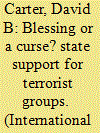

|
|
|
|
|
| Publication |
2012.
|
| Summary/Abstract |
Little existing work has systematically examined the factors that help terrorist groups survive or contribute to their failure. State support for terrorist groups is commonly thought to be a factor that helps groups to survive. I demonstrate with newly collected data that state sponsorship is not always helpful to terrorist groups. The resources provided by sponsors increase a group's ability to maintain itself internally. However, when a group has a sponsor that provides it with safe haven, the risk of the group being forcefully eliminated by the target increases. I argue that sponsors that provide safe haven can have incentives to provide information to the target about the groups to avoid potential costs from target military operations within their territory. The key empirical findings suggest that state sponsorship is a less serious problem for target states than many previously thought.
|
|
|
|
|
|
|
|
|
|
|
|
|
|
|
|
| 2 |
ID:
112135
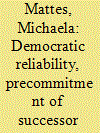

|
|
|
|
|
| Publication |
2012.
|
| Summary/Abstract |
Given frequent leadership turnover and leaders' need to appeal to voters, democracies should face difficulties in maintaining their alliance commitments. Yet the empirical evidence predominantly shows that they do make reliable allies. Democratic governments can increase reliability by binding future administrations through the choice of alliance commitment. While defense pacts precommit future leaders to close military cooperation with an ally, consultation pacts leave more room for discretion. This research note examines when precommitment through a defense pact is likely to occur. A government should be more likely to conclude a defense pact if potential successors have different preferences regarding the alliance, if the government believes that it will lose power soon, and if the costs of precommitment are not too high. I test the theoretical expectations using the Alliance Treaty Obligations and Provisions (ATOP) data between 1945 and 2003. The findings support the argument and suggest an answer to the puzzle of why states sometimes conclude whole-hearted commitments and other times seemingly half-hearted ones.
|
|
|
|
|
|
|
|
|
|
|
|
|
|
|
|
| 3 |
ID:
112131
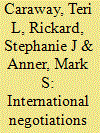

|
|
|
|
|
| Publication |
2012.
|
| Summary/Abstract |
What is the role of international organizations (IOs) in the formulation of domestic policy, and how much influence do citizens have in countries' negotiations with IOs? We examine these questions through a study of labor-related conditionality in International Monetary Fund (IMF) loans. Using new data from IMF loan documents for programs from 1980 to 2000, we test to see if citizens' economic interests influence IMF conditionality. We examine the substance of loan conditions and identify those that require liberalization in the country's domestic labor market or that have direct effects on employment, wages, and social benefits. We find evidence that democratic countries with stronger domestic labor receive less intrusive labor-related conditions in their IMF loan programs. We argue that governments concerned about workers' opposition to labor-related loan conditions negotiate with the IMF to minimize labor conditionality. We find that the IMF is responsive to domestic politics and citizens' interests.
|
|
|
|
|
|
|
|
|
|
|
|
|
|
|
|
| 4 |
ID:
112133


|
|
|
|
|
| Publication |
2012.
|
| Summary/Abstract |
The dominant approaches to the study of capital account liberalization have highlighted institutional barriers to reform and have also demonstrated an important role for interdependence, or the diffusion of a policy innovation from one country to another, as a causal force. Our approach contrasts with the institutional approach and seeks to clarify the political mechanisms of international policy diffusion. Specifically, we develop and test hypotheses that posit that structural economic legacies of the pre-reform era both condition the way in which international diffusion operates, and create the societal and economic interests that help produce varying capital account policy outcomes in the domestic political sphere. Analysis of capital account liberalization strategies in post-debt-crisis Latin America (1983-2007) reveals that capital account opening and the channels through which this innovation diffuses are conditioned by the legacy of a country's pre-debt crisis economic development model. Specifically, the degree to which advanced import-substituting industrialization was pursued prior to the reform era affects capital account policy by shaping both the relevant international peer groups through which policy models diffuse, and the sorts of domestic interests that are likely to influence the liberalization process. International diffusion also varies in its impact depending on domestic political and economic conditions.
|
|
|
|
|
|
|
|
|
|
|
|
|
|
|
|
| 5 |
ID:
112130
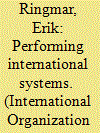

|
|
|
|
|
| Publication |
2012.
|
| Summary/Abstract |
This article provides a framework for the comparative study of international systems. By analyzing how international systems are framed, scripted, and performed, it is possible to understand how interstate relations are interpreted in different historical periods and parts of the world. But such an investigation also has general implications-inter alia for a study of the nature of power, the role of emotions in foreign policymaking, and public opinion formation. Case studies are provided by the Sino-centric, the Tokugawa, and the Westphalian systems. As this study shows, the two East Asian systems were in several respects better adapted than the Westphalian to the realities of international politics in the twenty-first century.
|
|
|
|
|
|
|
|
|
|
|
|
|
|
|
|
| 6 |
ID:
112132
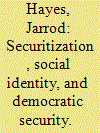

|
|
|
|
|
| Publication |
2012.
|
| Summary/Abstract |
The Democratic Peace stands as one of the most coherent and recognizable programs of study in international relations. Yet despite the pages of research devoted to the subject and claims about its law-like nature, the democratic peace remains a highly contested finding. In large part, this contestation arises out of an enduring question: What exactly keeps democracies from fighting? Drawing on the securitization theory of the Copenhagen School as well as social psychology, this article claims that a critical mechanism of the democratic peace lies at the political junction between policymakers and the public. I argue that the democratic identity of the public, grounded in basic democratic norms essential for the function of any democracy at any time, plays an independent role in the construction of security and foreign policy in the United States. To test the argument, I examine the difficult case of the 1971 Bangladesh War, when President Richard Nixon sent the USS Enterprise carrier group to the Bay of Bengal. Analysis of public statements as well as administration documentation reveals that, while Nixon and national security advisor Henry Kissinger actively saw India as a threat to U.S. interests, they were constrained by their belief that the public would not accept a security argument with respect to a fellow democracy.
|
|
|
|
|
|
|
|
|
|
|
|
|
|
|
|
|
|
|
|
|